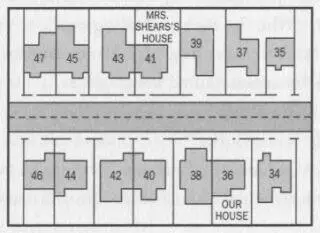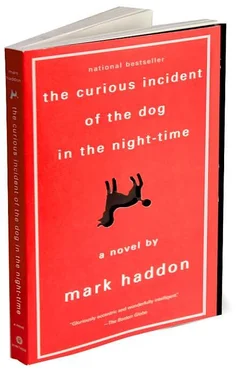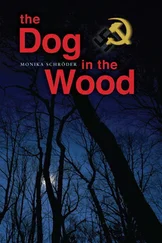The Reverend Peters makes a funny ticking noise with his tongue sometimes when he is thinking. And he smokes cigarettes and you can smell them on his breath and I don’t like this.
I said that there wasn’t anything outside the universe and there wasn’t another kind of place altogether. Except that there might be if you went through a black hole, but a black hole is what is called a singularity, which means it is impossible to find out what is on the other side because the gravity of a black hole is so big that even electromagnetic waves like light can’t get out of it, and electromagnetic waves are how we get information about things which are far away. And if heaven was on the other side of a black hole, dead people would have to be fired into space on rockets to get there, and they aren’t or people would notice.
I think people believe in heaven because they don’t like the idea of dying, because they want to carry on living and they don’t like the idea that other people will move into their house and put their things into the rubbish.
The Reverend Peters said, “Well, when I say that heaven is outside the universe it’s really just a manner of speaking. I suppose what it really means is that they are with God.”
And I replied, “But where is God?”
And the Reverend Peters said that we should talk about this on another day when he had more time.
What actually happens when you die is that your brain stops working and your body rots, like Rabbit did when he died and we buried him in the earth at the bottom of the garden. And all his molecules were broken down into other molecules and they went into the earth and were eaten by worms and went into the plants and if we go and dig in the same place in 10 years there will be nothing except his skeleton left. And in 1,000 years even his skeleton will be gone. But that is all right because he is a part of the flowers and the apple tree and the hawthorn bush now.
When people die they are sometimes put into coffins, which means that they don’t mix with the earth for a very long time until the wood of the coffin rots.
But Mother was cremated. This means that she was put into a coffin and burned and ground up and turned into ash and smoke. I do not know what happens to the ash and I couldn’t ask at the crematorium because I didn’t go to the funeral. But the smoke goes out of the chimney and into the air and sometimes I look up into the sky and I think that there are molecules of Mother up there, or in clouds over Africa or the Antarctic, or coming down as rain in the rain forests in Brazil, or in snow somewhere.
67.The next day was Saturday and there is not much to do on a Saturday unless Father takes me out somewhere on an outing to the boating lake or to the garden center, but on this Saturday England were playing Romania at football, which meant that we weren’t going to go on an outing because Father wanted to watch the match on the television. So I decided to do some more detection on my own.
I decided that I would go and ask some of the other people who lived in our street if they had seen anyone killing Wellington or whether they had seen anything strange happening in the street on Thursday night.
Talking to strangers is not something I usually do. I do not like talking to strangers. This is not because of Stranger Danger,which they tell us about at school, which is where a strange man offers you sweets or a ride in his car because he wants to do sex with you. I am not worried about that. If a strange man touched me I would hit him, and I can hit people very hard. For example, when I punched Sarah because she had pulled my hair I knocked her unconscious and she had concussion and they had to take her to the Accident and Emergency Department at the hospital. And also I always have my Swiss Army knife in my pocket and it has a saw blade which could cut a man’s fingers off.
I do not like strangers because I do not like people I have never met before. They are hard to understand. It is like being in France, which is where we went on holiday sometimes when Mother was alive, to camp. And I hated it because if you went into a shop or a restaurant or on a beach you couldn’t understand what anyone was saying, which was frightening.
It takes me a long time to get used to people I do not know. For example, when there is a new member of staff at school I do not talk to them for weeks and weeks. I just watch them until I know that they are safe. Then I ask them questions about themselves, like whether they have pets and what is their favorite color and what do they know about the Apollo space missions and I get them to draw a plan of their house and I ask them what kind of car they drive, so I get to know them. Then I don’t mind if I am in the same room as them and don’t have to watch them all the time.
So talking to the other people in our street was brave. But if you are going to do detective work you have to be brave, so I had no choice.
First of all I made a plan of our part of the street, which is called Randolph Street, like this:

Then I made sure I had my Swiss Army knife in my pocket and I went out and I knocked on the door of number 40, which is opposite Mrs. Shears’s house, which means that they were most likely to have seen something. The people who live at number 40 are called Thompson.
Mr. Thompson answered the door. He was wearing a T-shirt which said
BEER
Helping Ugly People Have Sex for 2,000 Years
Mr. Thompson said, “Can I help you?”
I said, “Do you know who killed Wellington?”
I did not look at his face. I do not like looking at people’s faces, especially if they are strangers. He did not say anything for a few seconds.
Then he said, “Who are you?”
I said, “I’m Christopher Boone from number 36 and I know you. You’re Mr. Thompson.”
He said, “I’m Mr. Thompson’s brother.”
I said, “Do you know who killed Wellington?”
He said, “Who the fuck is Wellington?”
I said, “Mrs. Shears’s dog. Mrs. Shears is from number 41.”
He said, “Someone killed her dog?”
I said, “With a fork.”
He said, “Jesus Christ.”
I said, “A garden fork,” in case he thought I meant a fork you eat your food with. Then I said, “Do you know who killed him?”
He said, “I haven’t a bloody clue.”
I said, “Did you see anything suspicious on Thursday evening?”
He said, “Look, son, do you really think you should be going around asking questions like this?”
And I said, “Yes, because I want to find out who killed Wellington, and I am writing a book about it.”
And he said, “Well, I was in Colchester on Thursday, so you’re asking the wrong bloke.”
I said, “Thank you,” and I walked away.
There was no answer at house number 42.
I had seen the people who lived at number 44, but I did not know what their names were. They were black people and they were a man and a lady with two children, a boy and a girl. The lady answered the door. She was wearing boots which looked like army boots and there were 5 bracelets made out of a silver-colored metal on her wrist and they made a jangling noise. She said, “It’s Christopher, isn’t it?”
I said that it was, and I asked her if she knew who killed Wellington. She knew who Wellington was so I didn’t have to explain, and she had heard about him being killed.
I asked if she had seen anything suspicious on Thursday evening which might be a clue.
She said, “Like what?”
And I said, “Like strangers. Or like the sound of people arguing.”
Читать дальше













